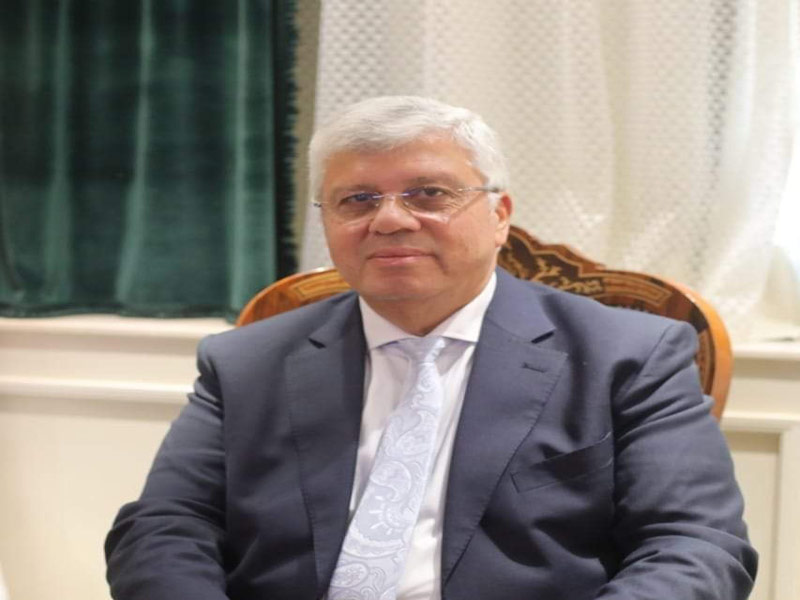The Minister of Higher Education reviews a report on the qualification of a number of laboratories in Egyptian universities for international accreditation, at a cost of 34 million pounds
Dr. Ayman Ashour, Minister of Higher Education and Scientific Research, reviewed a report submitted by Dr. Hesham Farouk, Assistant Minister for Digital Transformation and Acting Executive Director of the Higher Education Development Projects Management Unit, about the unit’s rehabilitation of a number of laboratories in Egyptian universities for international accreditation, at a total cost of 34 million pounds.
Dr. Hesham Farouk confirmed the necessity of adopting these laboratories; This is to serve the educational, research, societal and environmental process, and to provide a distinct and permanent source of income for the college and university, as well as to improve the level of Egyptian universities in international rankings.
The report indicated that the Project Development Unit supported and financed (7) laboratories at the Faculty of Medicine, Cairo University, at a total cost of (5,320,000 pounds), which are laboratories (marrow transplantation - molecular biology in the Clinical Pathology Department - Microbiology Unit in the Pathology Department Microbiology unit in the laboratory of Abu Al-Rish Al-Munirah Children’s Hospital- Tuberculosis Diagnostic Unit in the Clinical Pathology Department- Bone Marrow Pathology at the Children’s University Specialized Hospital- Histocompatibility- Reference lab for immune blood cell tests at the Transfusion Services Center).
The report stated that the unit provided financial support and funding to 14 laboratories at Ain Shams University, at a total cost of (9,600,000) pounds, which are (Water Quality in Irrigation and Hydraulics Department - Egypt’s Center of Excellence for Solid Waste Management) at the Faculty of Engineering, as well as (Clinical Chemistry and Emergency) laboratories. In the central laboratories - the emergency at Ain Shams University Hospital - hematology and flow cytometry in the main laboratories at Ain Shams University hospitals - microbiology and its qualification for accreditation in the main laboratories at Ain Shams University hospitals - Molecular Biology in the Prof. Dr. Ali Khalifa unit - Hormones and tumor markers in the Prof. Ali Khalifa unit - Clinical Immunology And molecular laboratories in the main laboratories of Ain Shams Hospitals) at the Faculty of Medicine, in addition to the laboratories of the Faculty of Agriculture receiving support, including (Agriculture lab in arid areas - Food safety lab at the Microbial Wealth Center - Laboratory for analyzing pesticide residues in food), and the laboratories of the Faculty of Science received support and funding. , which are the parameters of (Atomic Spectra and Elemental Analysis at the Central Laboratory - Ultrafast Dynamic Spectrophotometry, Department of Chemistry).
The report pointed out the financing of (6) laboratories at Fayoum University at a total cost of up to (6,200,000 pounds), including the laboratories of the Faculty of Engineering, which are (construction lab, properties and resistance of materials and reinforced concrete - roads and traffic engineering lab - soil mechanics and foundations lab), as well as faculty laboratories. Agriculture, which is (the central laboratory for soil and water analysis - the laboratory for analyzing environmental and food pollutants), in addition to the laboratories of the College of Science, which is a (thin-film laboratory for water purification and desalination).
The report added that financial support and funding has been provided to (4) laboratories at Benha University at a total cost of (4,100,000 pounds), which include the laboratories of the Faculty of Medicine at the university, which are (the early detection of pathological tumors laboratory - the laboratory of the Molecular Biology and Biotechnology Unit - the laboratory of the Analytics Unit). Medical subspecialty, Department of Clinical Pathology - Toxicology and Narcotics Laboratory).
The report referred to the financing of the Project Development Unit for the Solar Energy Plant at the Faculty of Technology and Industrial Education at Suez University, at a cost of (1,200,000 pounds). This plant is the first partnership between Suez University and the project to qualify laboratories for international accreditation of the Project Development Unit at the Ministry of Higher Education; It aims to reduce toxic gas emissions from electricity generation by traditional methods, by supporting projects based on solar energy. The report pointed out that the unit financed (9) laboratories at Sadat City University, at a total cost of 5,100,000 pounds, which are laboratories (environmental and food biotechnology - molecular diagnostics, therapeutics and genomes - tissue culture and genetic engineering center) at the Genetic Engineering Research Institute and Biotechnology, As well as laboratories (diagnosing rabies - Central Laboratory for Chemical Diagnostics and Blood Research - Sadat Center for Feed and Raw Material Analysis - Food Health Control Laboratory) at the College of Veterinary Medicine. The Environmental Geology Laboratory at the Institute of Environmental Studies and Research received support and funding from the Project Development Unit, as well as funding Medicines and Cosmetics Analysis Laboratory, Faculty of Pharmacy.
The report clarified the unit’s financing of two laboratories at the Faculty of Science, Damietta University, at a cost of up to EGP 2,600,000. They are (Microanalysis Laboratory for Water Research - Microanalysis Laboratory for Air Research and Climate Changes).
Dr. pointed out. Al-Sawy Ahmed, a quality expert and consultant in the unit, led a team of laboratories experts in the projects unit headed by Dr. Osama Jalal, Acting Director of the Laboratory Rehabilitation Project for International Accreditation, and Dr. Farhat Moghnem, Dr. Mahmoud Wafik, consultants in the laboratory rehabilitation project for international accreditation, visited the laboratories; To qualify it for international accreditation in accordance with the axes of the state’s executive plan (2020-2030) in order to achieve the principles and goals of sustainable development in all fields, and to settle them in the various state agencies.


.svg)




